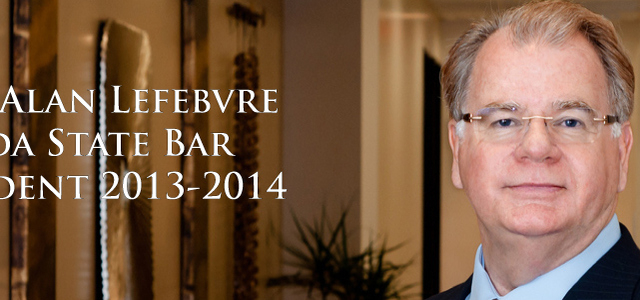State Bar president’s lonely defender
Nevada State Bar President Alan Lefebvre may have drawn criticism from progressive lawyers, the dean of the Boyd Law School at UNLV, the Boyd faculty and the GLBT Section of the state bar, but that doesn’t mean he’s got nobody in his corner.
Ed Whelan, writing on National Review Online, penned a trio of blogs targeting the critics of Lefebvre, who penned a column in the State Bar’s official publication, Nevada Lawyer, attacking Attorney General Catherine Cortez Masto for dropping the state’s defense against a lawsuit seeking to invalidate a ban on gay marriage in the Nevada Constitution.
(Meanwhile, the state Bar’s Board of Governors on Thursday heard testimony against Lefebvre that argued, among other things, his column was an improper use of lawyers’ dues to advance a political agenda. The board late this afternoon issued a statement saying the views expressed in the column were not those of the State Bar, and affirming that the president’s column in Nevada Lawyer was not to be used to express personal political views. Some bar members, however, were dissatisfied that the board didn’t go farther in condemning Lefebvre’s column.)
Whelan first attacks a letter written by the faculty of UNLV’s Boyd Law School, which laments that “…the tone of Mr. Lefebvre’s undignified column brings disrespect on the Bar and undermines principles of professionalism that we endeavor to instill in our students.” Further, the faculty says “it is thus regrettable that Mr. Lefebvre’s essay consists largely of insults, ad hominem attacks, sarcasm, and sectarian references that are simply inappropriate for the leader of an important institution in a vibrant and diverse state.
Writes Whelan: I don’t know which passages of Lefebvre’s column the faculty signatories particularly object to, but their assertion that the column “consists largely of insults, ad hominem attacks, sarcasm and sectarian references” is patently false, as any reader of the column will quickly discover.
Well, given that the headline of Lefebvre’s piece was “Dereliction of duty,” his first line was that “our attorney general dropped the Constitution as a client” and he goes on to explain that “the duty [to uphold the oath of office] applies when it it is more than 110 degrees and on overcast days alike,” it seems like we’ve got insults and sarcasm covered.
But Lefebvre got himself in a lot deeper when he declared, “sexual preferences aren’t overt and are about behavior….” In fact, most people acknowledge that sexual orientation is not a choice, or a preference, and people of any orientation aren’t distinguished just based on their behavior. So we’ve got our ad hominem covered there.
After continuing to accuse Cortez Masto of expediency in her decision, claiming she “likely feared the consequences if she didn’t yank the brief,” Lefebvre says, “there are lots of powerful, vengeful people among the elite. The progressives’ pieties are to be followed without deviation or the heresy axe will fall.” And he concludes by suggesting “somebody in the federal government owes an apology to the State of Deseret,” a never-consummated proposal to create a Mormon state out of much of the west. Sectarian reference, check, although Whelan dismisses it by saying it can’t be sectarian since Lefebvre is Catholic, not Mormon.
Finally, Whelan attacks a line in which the Boyd faculty claim “…Mr. Lefebvre’s column was lacking in the civility that should guide the behavior of every Nevada attorney.” To rebut, Whelan cites a December 2001 column by former Review-Journal freelance columnist Ken Ward, which recounts allegedly uncivil treatment Boyd students and faculty gave to Marine Corps legal recruiters 13 years ago.
Then again, perhaps Ward isn’t the best witness to call in this case: He once wrote (approvingly) in the pages of the execrable and blissfully defunct Liberty Watch magazine that an “unreconstructed Southerner” could precisely identify the year America went off the rails: 1865, the year the South lost the Civil War.
Dissing the dean
Whelan then turns his fire on Boyd Law School Dean Daniel Hamilton, who wrote a letter of his own to the State Bar objecting to Lefebvre’s column as being “at odds with the best traditions of tolerance and respect for dissenting views that characterize the legal profession and the Nevada bar.”
“The [U.S.] Supreme Court’s decisions last year in Hollingsworth v. Perry and United States v. Windsor had the effect of invalidating statutes that prohibited or placed unequal burdens on same-sex partners,” Hamilton wrote. “As challenges to prohibitions on same-sex marriage proliferate, states — from Ohio to Utah and Arkansas — are now confronting the likelihood that their statutes or constitutional provisions are unenforceable.
“Both Hollingsworth and Windsor involved decisions by government officials not to defend laws they believed to be unconstitutional,” Hamilton added. “And in neither case did the Supreme Court question the prerogative of state officials to exercise that discretion.”
Whelan is not persuaded: Hamilton nakedly (and wrongly) asserts that the state attorney general’s decision not to defend Nevada’s laws was “well-reasoned.” But he doesn’t bother to confront Lefebvre’s arguments.
But it’s actually Whelan who doesn’t bother to confront Hamilton’s arguments. Whelan cites an opinion piece he wrote in The Weekly Standard magazine, which admits that “some ominous language” in the Windsor case suggests that anti-gay marriage laws are unconstitutional. That’s as close as he comes to debating Hamilton on that issue.
As for Perry? Whelan writes: Hamilton thinks it significant that the Supreme Court, in the Prop 8 case, didn’t “question the prerogative of state officials to exercise [the] discretion” not to defend state laws. But the case didn’t present that question. The Supreme Court doesn’t have general supervisory authority over state attorneys general, so there was no reason for the Court to address the matter.
This fellow is the dean of a law school (even a fourth-tier one)?!?
The Perry case presented the question of whether or not the authors of California’s anti-gay marriage constitutional amendment could defend it from legal attack once the attorneys general of the state had refused to do so, claiming they believed the amendment was legally indefensible. The court said the initiative’s authors didn’t have standing to defend the voter-enacted amendment, even if the state declined to present a defense. Viewed another way, the Supreme Court elected to avoid deciding the merits of the California controversy based upon the decision of state officials not to defend it. Presumably, justices could have remanded the case back to the Ninth Circuit with a request for further briefing from the state, but justices simply and quickly ruled on the narrower standing issue alone.
Oh, by the way, Boyd is ranked at No. 83 on U.S. News and World Report’s best law schools survey, higher than Loyola Marymont, Villanova University and Gonzaga University, all of which are more expensive than Boyd. So there.
Demanding a remedy
Finally, Whelan attacks a letter from the LGBT Section of the State Bar that objects to Lefebvre’s column, asserting that it violates Bar policies, is inaccurate and incomplete. The letter requests the Bar issue a news release clarifying that the column “in no way expresses the opinion of the Board or the members of the State Bar of Nevada.”
LGBT Section members argued that, in addition to being well-founded on the basis of the Windsor case, Cortez Masto’s decision was also consistent with her duty to see justice done, and her oath to the U.S. Constitution. “Since [Windsor], every decision issued by the federal courts have struck down anti-same sex marriage amendments to state constitutions as also being violative of either the state’s constitution or the federal constitution or both,” the letter reads. “President Lefebvre’s column fails to address the evolution of legal treatment of LGBT persons or actions by attorneys general in other states to discontinue defending similar bans on such bases, including Kentucky, Oregon, Pennsylvania and Virginia.”
The letter also notes something Lefebvre omitted from his original article: the fact that former attorney general and federal judge Gov. Brian Sandoval agreed with Cortez Masto’s decision.
Whelan, once more, disagrees:
The LGBT Section letter asserts that Lefebvre has violated state bar rules by “making statements concerning [his] personal opinions.” Again, what Lefebvre has done is what bar officials throughout the country ought to be doing: defending the basic understanding of the duty of a state attorney general.
The LGBT Section letter contends that because the state attorney general takes an oath to the federal Constitution, her “first duty of loyalty is to the United States government and the United States Constitution.” Well, all or nearly all lawyers practicing in this country take an oath to the federal Constitution. No one has ever understood the taking of that oath as license for a lawyer to sacrifice his client’s interest to his own personal reading of the Constitution or to his own predictive reading of how the Supreme Court will rule on an unresolved issue.
In sum, Lefebvre deserves hearty acclaim from the state bar and from anyone who cares about the rule of law.
There is, as I have said from the beginning, a legitimate argument to be had over what an attorney general should do when confronting the need to defend a law in which he or she does not believe. But Lefebvre’s column wasn’t as much about that as about accusing Cortez Masto of abandoning her duty and lamenting the political state of affairs when it comes to marriage equality.
In fact, Cortez Masto mounted a vigorous defense of the law up until the moment she became convinced that Nevada’s constitutional amendment would not survive legal scrutiny in the Ninth Circuit. At that point, she acted in good faith to withdraw the state’s defense, based not on some future ruling of the Supreme Court, but upon an actual panel decision of the Ninth Circuit. Far from abandoning the rule of law, Cortez Masto upheld it, and the criticism of Lefebvre’s column from so many quarters constitutes hearty acclaim for the attorney general, not against her.

















